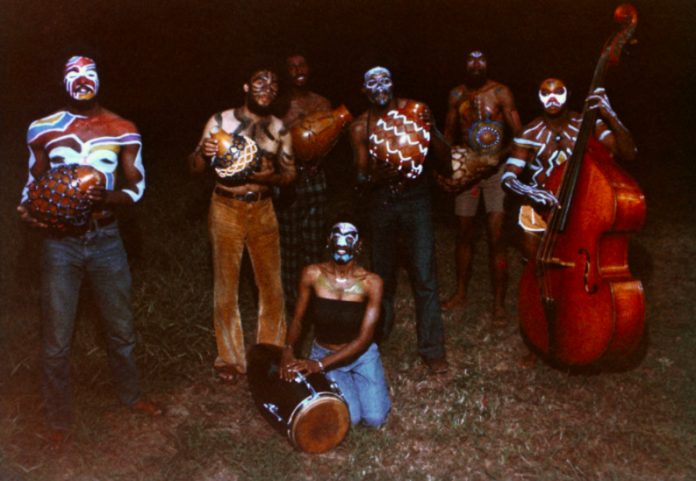Witness the rhythmic agency of soundtracking a movement. Prudent is the beat that moves your feet and mind simultaneously, jolting up new pathways of consciousness. Full-body instruction keeps a social sentiment evergreen, allowing cultural longevity—not pop consumerism—to determine how far inspiring art shall eventually reach.
James “Plunky” Branch, the saxophonist and leader of Oneness of Juju, provided just the right mix of avant-garde influences and African spirit to nourish a Black Arts movement in the last century. Trace the notes from where they began in San Francisco around 1969 with South African exiled jazz man Ndikho Xaba, then traveled through New York’s loft jazz scene, eventually moving back to mid ’70s Richmond, Virginia. Oneness of Juju’s forward-looking outfit deserves its own categorization. Inspired by John Coltrane, Sun Ra, Pharaoh Sanders, Ornette Coleman, and other free jazz mavericks, Plunky’s concept and insight still resonate today.
The music’s lineage runs through Idris Acakamoor and The Pyramids to contemporary producers like the prolific J-Dilla, who sampled Branch’s music on his 2001 track “African Rhythms.” Certainly worth mentioning is the late great Ras G a.k.a. Gregory Shorter Jr., whose intercom speaker trademark shouts of “oh Raaaas” and “African Space Base” were calls to Black consciousness, their urgency the perfect accompaniment to his nourishing beat-indentation.
African Rhythms 1970-1982, a new remastered compilation from Strut Records was first re-issued in 2002, and then in 2018. Today, it still sounds right on time. It was released in conjunction with a brand new deal with the seminal independent black jazz and soul label Black Fire, and includes newly added unreleased tracks.
This is the anti-COVID soundtrack of social distancing. Packed with reformist thwack-disco, funk, soul, jazz, fusion, R&B, it signals the process through which Black music gave birth to go-go, hip-hop, house, and techno. The result is riotous noise to which one can dance, march, yell, or fight for social justice.
Bear witness to the opening track “African Rhythms,” with its recognizable bass line that DJs from David Mancuso to Larry Levan have needle dropped, pause taped, and used as soundtrack to shout outs ad infinitum over the past 50 or so years. The song gets a proper lyrical addendum: “These are African rhythms passed down to us from the ancient spirits, feel the spirit, a unifying force, come on move with the spirit, stand up, clap your hand, move with the rhythm, get down, get off.”
On the fortified “Chants/Don’t Give Up,” gospel-trained vocalist Jackie Holoman-Lewis glides over restless, fidgety horn charts. “Now every day can’t be a winner, oh no, sometimes you just gotta lose, so prepare yourself for days like these, remember nothing in this world comes with ease,” goes the sermon. It’s a bend-but-don’t-break presentation that sorts the memorandum and groove of a classic Curtis Mayfield banger arrangement with “Superfly”-esque bass riffs from Muzi Branch, terrific Blaxploitation clavinet, and Fender Rhodes work from Al-Hammel Rasul. “Chants/Don’t Give Up” unfurls segment by segment into a dance floor jazz killer. Plunky converts his sheets of sound sax technique into a talking, honking, squawking bombardment reminiscent of a live Kool and The Gang album.
It’s such a watershed solo that Plunky lets loose a “whoa” toward the end, the perfect accentuation of such fire. One wraps one’s head around the message, then almost loses it, nodding out to the massive wall of bump. After notes of Talking Heads are invoked, the expanded band version that featured artists Adrian Belew, Funkadelic keyboardist Bernie Worrell, bassist Busta “Cherry” Jones, Ashford & Simpson percussionist Steven Scales, and backing vocalist Dolette MacDonald, all the way down the line to that first Sting project “Dream Of The Blue Turtles” featuring Branford Marsalis. Impersonators will never be able touch this hardscrabble feel, those hustling blues.
Pulling in the opposite direction, “Space Jungle Funk”, representative of when the outfit expanded from the dance floor into additional experimental regions, is just as groundbreaking if not as commercially viable. One gets a translucent Weather Report vibe that hangs, traveling without moving. On this track, Plucky uses an Electric Maestro Bi-Phased Saxophone for an aquatic, double-toned effect. The addition of Joe Bonner, Pharaoh Sanders pianist, makes for ample plinking color chords on the track, while guitarist Ras Mel a.k.a Melvin Glover and bassist Muzi Branch trade riffs and patterns on which Plucky squeezes out Jacques Cousteau-type watercolors.
Consequently, African Rhythms 1970-1982 expresses two different atmospheres at a rave. One, a peak time psychedelic ground-floor pandemonium movement, the other a chill room examination of the real-time bliss of free jazz in its coolness mode. Yes indeed, electronic musicians need to pay homage to this group. They too are seeds from the same giving tree.







